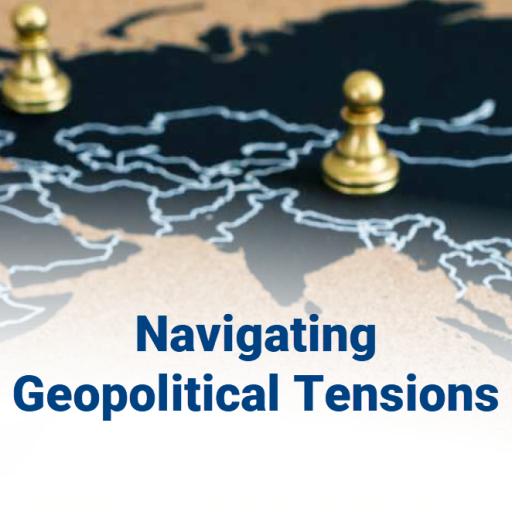Navigating Geopolitical Tensions – MHEDA members navigate the evolving global market.
By Christine Preusler
GEOPOLITICAL TENSIONS MAY be distant concerns amid day-to-day operations, but they’re hitting the material handling industry directly and in real time.
“Current global tensions — including U.S. – China trade policies, conflicts in Eastern Europe and the Middle East and labor disruptions — are reshaping how businesses source materials and manage logistics,” said Nathan Storey, president of Storage Solutions, Inc., in Westfield, Indiana, said.
According to a January 2025 Reuters report, a recent Biden administration probe found China employs unfair tactics, such as trade barriers and intellectual property theft, to dominate global shipbuilding. Discussions of imposing tariffs or port fees on Chinese-built ships have emerged as a potential measure. Meanwhile, the Wall Street Journal reported that President Trump is pursuing a “golden age” economy with executive orders to boost domestic manufacturing and energy production while imposing new tariffs on China, Canada and Mexico.
As Storey mentioned, global conflicts have also disrupted the industry, causing supply chain delays, increasing transportation costs and necessitating route diversions. For example, the ongoing conflict in the Middle East has led to shipping disruptions, with companies rerouting vessels around the Cape of Good Hope instead of the Suez Canal, resulting in longer transit times and higher costs.
Labor disruptions, too, have significantly impacted global supply chains. In October 2024, a strike involving approximately 45,000 U.S. port workers caused industry delays and price hikes, though a contract extension kept negotiations ongoing. Demands for higher wages and concerns over automation drove the strike, significantly impacting supply chains while highlighting ongoing challenges in labor relations.
How Leaders Are Responding
Given the unpredictable nature of these global challenges, business leaders are turning to proactive measures to strengthen their operations and mitigate risks.
Simon Witdouck, chief operations officer and senior vice president of TVH Americas, highlighted a shift in business strategy: “After a long period of ever-increasing globalization, current geopolitical events are shifting the direction back to a more regional setup,” he said. “Companies will need to re-assess their current setup to determine if they are organized appropriately to deal with this change.”
Witdouck also discussed the growing importance of integrating geopolitical risks into risk management strategies. “Geopolitical events have been a key element in risk management for some time,” he said. “However, recent events have accelerated and prioritized the discussions thereon. A priority for all risk management is building insights into current setups while simulating pivots based on various types of disruptions.”
Storey said Storage Solutions, Inc., evaluates the complex and evolving nature of global trade, geopolitical conflicts and labor dynamics by focusing on the areas of business most directly impacted: supply chain stability, material costs and regulatory changes. “We proactively monitor risks, strengthen supplier relationships and invest in strategic planning to help navigate these market challenges with confidence,” he said.
For Lori Palmer, president of REB Storage Systems International in Darien, Illinois, the answers to geopolitical questions lie within proactive planning. “Establishing a Geopolitical Risk Framework is critical in aligning business operations with an increasingly unpredictable global landscape,” Palmer said. To do so, her company monitors regional and industry-specific risks, assessing how conflicts or regulatory changes could disrupt their supply chains and customer access.
Building resilient supplier networks is another key to mitigating these challenges. Palmer emphasized the importance of diversifying suppliers and establishing secondary relationships to prevent disruption when crises strike. “Understand how geopolitical issues (e.g., trade disputes or sanctions) might disrupt customer access to products or services,” she recommended. “Develop localized strategies for affected regions, including stockpiling, alternative distribution channels and potential relocation of services.”
Some, for example, are already adjusting to U.S. policymakers’ efforts to strengthen domestic manufacturing. According to a recent survey by the global professional services network KPMG, nearly 70% of U.S. executives plan to shift their supply chains closer to the U.S. and the Americas within the next two years to reduce risks associated with tariffs and boost speed to market, among other benefits.
Companies are also confronting significant financial risks. Gerardo Padilla, CEO of Seil Rentals SA de CV in Saltillo, Coahuila, Mexico, said navigating these risks as a forklift dealer requires proactive steps: Diversifying suppliers, keeping a healthy inventory and maintaining financial resilience.
“For example, working with a variety of suppliers can help avoid major delays if one source has issues,” he said. “Keeping a healthy inventory of key items is also smart, so you’re not caught off guard by shortages.”
Financial resilience also means hedging against currency fluctuations and diversifying customer bases. “Expanding your services, like offering more maintenance options or local support, can keep customers happy and give you an edge,” Padilla said. “It’s really about being flexible and prepared for anything.”
Regulatory Challenges and Sustainability
While supply chain disruptions and financial uncertainties dominate the discussion, the regulatory environment is also becoming more complex. As Storey pointed out, the rise of Environmental, Social and Governance regulations, data privacy laws and evolving trade compliance requirements add layers of risk for companies.
“Ensuring compliance while maintaining operational efficiency is a growing concern,” he said.
At Toyota Material Handling North America, president and CEO Brett Wood sees the challenge of navigating regulatory shifts as central to strategic planning.
“Trade controls such as tariffs, sanctions and export restrictions are a big factor, and sectors like manufacturing always seem to be in the middle of the conversation,” he said. “Taking care of our customers is always at the center of our strategy, so anything we can do to remove these distractions will help us stay focused on the right things.”
Toyota relies on real-time intelligence and predictive analytics to keep its operations agile. “We use advanced simulation tools to produce ‘what if’ scenarios,” Wood said. “We have also spent a lot of time developing offsite redundant systems so we can operate critical business systems even if geopolitical events threaten local business disruptions.”
AI-driven platforms, risk intelligence tools and advanced simulation technologies allow companies to anticipate disruptions and adjust their strategies accordingly. Palmer highlights how these tools provide custom alerts for sanctions, regulatory changes and political instability, allowing businesses to make proactive decisions.
“In the event of an attack, our protocol involves restoring the last non-corrupted backup and reinstalling it onto either the existing or a new server,” she said. “This ensures minimal disruption and data recovery.”
Witdouck emphasized the crucial role of technology in managing the ever-changing geopolitical landscape. “[Technology] allows us to have quicker access to the most relevant data as well as connecting various data points throughout the entire supply chain,” he said. “This, in turn, makes it possible to improve our responses and make better decisions in view of such geopolitical disruptions.”
Leadership in Crisis Management
The ability to respond quickly isn’t just about technology — it’s also about leadership. For Padilla, fostering a resilient corporate culture starts with building an environment where employees feel empowered. “When people feel trusted and capable, they’re more likely to step up in difficult situations,” he said.
At Toyota, leadership focuses on ethical decision-making, resilience and employee well-being. “We need to lead by example and be anchored by ethical decision-making, resilience and flexibility,” Wood said. “We believe in frequent updates, open lines of two-way communication channels and being crystal clear about our vision and goals, particularly if there is a significant impact from outside geopolitical events.”
Storey said leaders can foster a resilient corporate culture by prioritizing adaptability, clear communication and strategic problem-solving. He advocates for a culture that embraces change, offers regular updates during uncertainty and encourages teams to anticipate challenges. “Resilience starts with a strong foundation of trust, collaboration and proactive leadership,” he said.
Ultimately, these industry leaders are charting a course for resilience amid uncertainty. By strengthening supply chains, embracing technology and fostering a flexible corporate culture, businesses in the material handling industry are positioning themselves to thrive — no matter what the geopolitical future holds.
As Padilla said: “If leaders model confidence and adaptability, it inspires the whole team to approach challenges with the same mindset. A culture like this doesn’t just weather disruptions — it finds ways to grow and thrive because of them.”
Article Takeaways
1. Establish a Geopolitical Risk Framework. This will align business operations with global uncertainties, emphasizing proactive planning and monitoring of regional risks.
2. Build Resilient Supplier Networks. Do this through diversification and secondary relationships to help mitigate disruptions caused by geopolitical issues.
3. Embrace Technology. AI-driven platforms and predictive analytics enables companies to anticipate and manage geopolitical disruptions effectively.
Article Sources
1. Reuters. “Exclusive: US Probe Finds China Unfairly Dominates Shipbuilding, Paving Way for Penalties, Sources Say.” Accessed Jan. 28, 2025. www.reuters.com.
2. The Wall Street Journal. “Trump Tries to Forge ‘Golden Age’ Economy of Self-Reliance and Defiance.” Accessed Jan. 28, 2025. www.wsj.com.
3. Reuters. “Second US Port Strike Averted as Union, Employers Reach Deal.” Accessed Jan. 28, 2025. www.reuters.com.
4. The Guardian. “Global Chains are Under Pressure Again. Will Inflation Start Rising?” Accessed Jan. 28, 2025. www.theguardian.com.
5. KPMG. “Global to Local: Strategic Shoring and the Future of Supply Chains.” Accessed Jan. 28, 2025. kpmg.com




